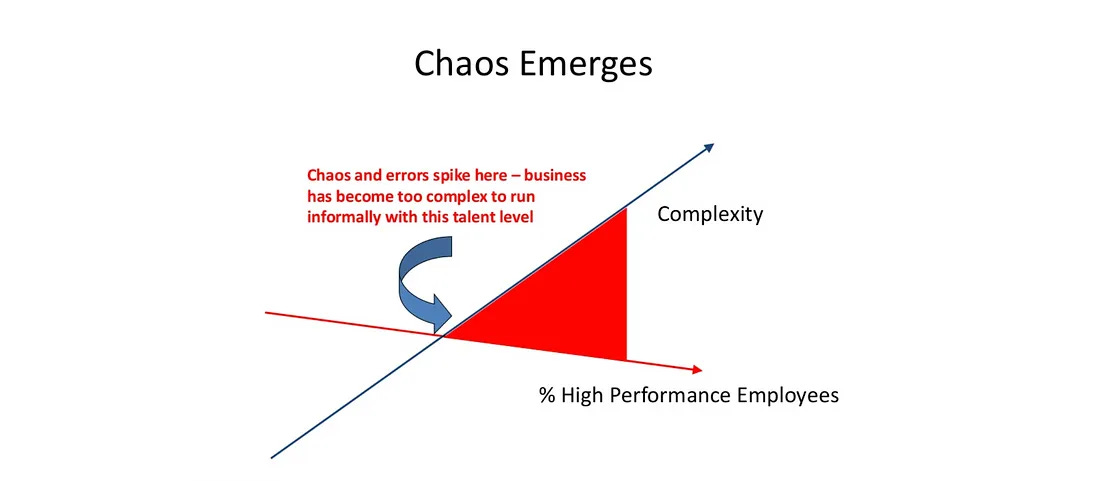The challenge of retaining high talent density while growing.
Written by @Giorgos Vareloglou
Just after leaving our previous venture isobar & iProspect with my partner and looking into the next thing we’re building, we spent quite some time in studying other reputable companies, to look out for best practices. to launch and scale successful business models in the long run. What was more interesting to me was how you sustain steady growth rates after a certain point, and the answer came from a book I was reading about Netflix’s story. It was written by Patty McKord titled “Powerful: Building a Culture of Freedom and Responsibility”. This book is the longer story behind a deck that went viral a decade ago under the name: “The Netflix culture deck”.
Find it here: https://www.slideshare.net/reed2001/culture-1798664
What caught my attention was slides 40 to 78 but more specifically 45 to 57 (have a look on these 12 slides if you are too bored to read the rest of the deck). This section answered a challenge we had while growing our previous venture, but i’m sure our experience is common among anyone that has grown a business of any kind. The story goes like this:
You start your venture to change the world with a handful of great people.
You grow fast reaching the top of your market. Until that point the structure of your company is pretty much flat. Lots of chaos there.
You reach a tipping point where chaos is not a choice anymore. Everyone agrees to it.
You start adding process and layers to put some order in chaos. Everyone is relieved. Besides the fact that things are not as it used to be everyone agrees that it’s better now. A very seductive option on the short term.
Nothing changes, except the percentage of high performers in your total population decreases. It’s natural since the total population is growing but it’s also affordable since you can live without high performing talents. You are now a company with processes in place that make sure that even a moderate performer will not significantly impact the company’s outcome.
Congratulations! You are now running a process driven organisation. And there’s nothing wrong with that, until the market shifts.
At this point you realise you don’t have the intellectual capacity (hence the critical mass of top performing talents) to pivot and retain your position in the market.
So what Netflix suggests there, is the counter intuitive option to do two things instead, when reaching that tipping point:
Reduce process as you grow.
Increase talent density faster than complexity grows.
While building REBORRN and having experienced that tipping point before (where we did what most companies do), we have these two principles in mind. We try to foster an environment of freedom and responsibility and we are creating a business that can afford high performing talents.
The second thing Netflix is really popular about, after the culture of freedom and responsibility, is Top market compensation policy. To stay true to its commitment to high talent density, Netflix has throughout the years committed to top market compensation for every important role in the company. The impressive part is that they proactively adjust annual compensations for roles that have increased demand in the market, but they re also keen to let someone go when he’s no longer a high performer in his role. They even value impact and high performance more than loyalty. They see their teams not as a family but more like a Pro Sports team.
While i’m sceptical on the dilemma of Performance over Loyalty, i’m convinced that a top market compensation strategy is worth trying, even if it gets a bit tricky when it comes to professional services, where labour is your only cost center.
To stay true to this “experiment” we have created a high compensation model for Partners joining REBORRN and we make sure we get above market average salaries for all our people. But today we are making one more step in discovering talent in a market where talent is pretty scarce and the competition from startups and big corporates is fierce.
We launch a paid internship, that might be one of the market’s highest paying internship programs. We are looking for graduates in Greece or abroad, greeks or foreigners to start their career at REBORRN with an annual compensation that exceeds €18.000 annually. For those not living in Greece, this is a €1000net/month salary compared to 600net/month or lower, which is the most common internship salary in the greek market.
We figured out that’s the only way to stand out and attract the market’s top talent that is now graduating from greek or foreign universities, making our case to stay in Greece or come back after getting their degree.
We are now looking for Business Analysts, but this is a policy we aim to retain for future entry level openings.
More details on the jobs here.
The author: Giorgos Vareloglou



